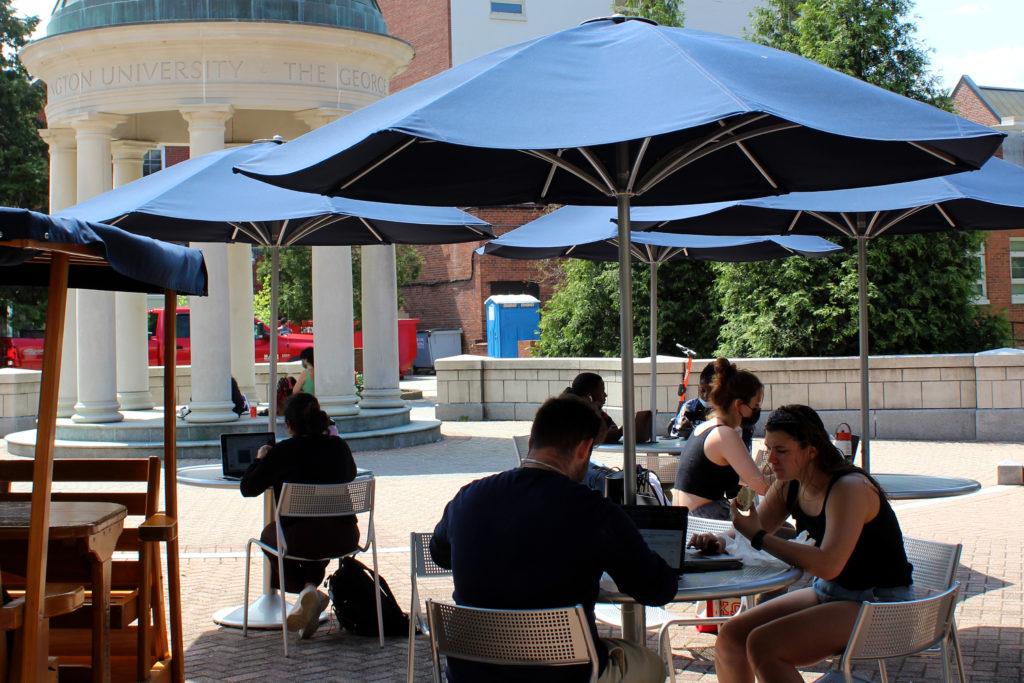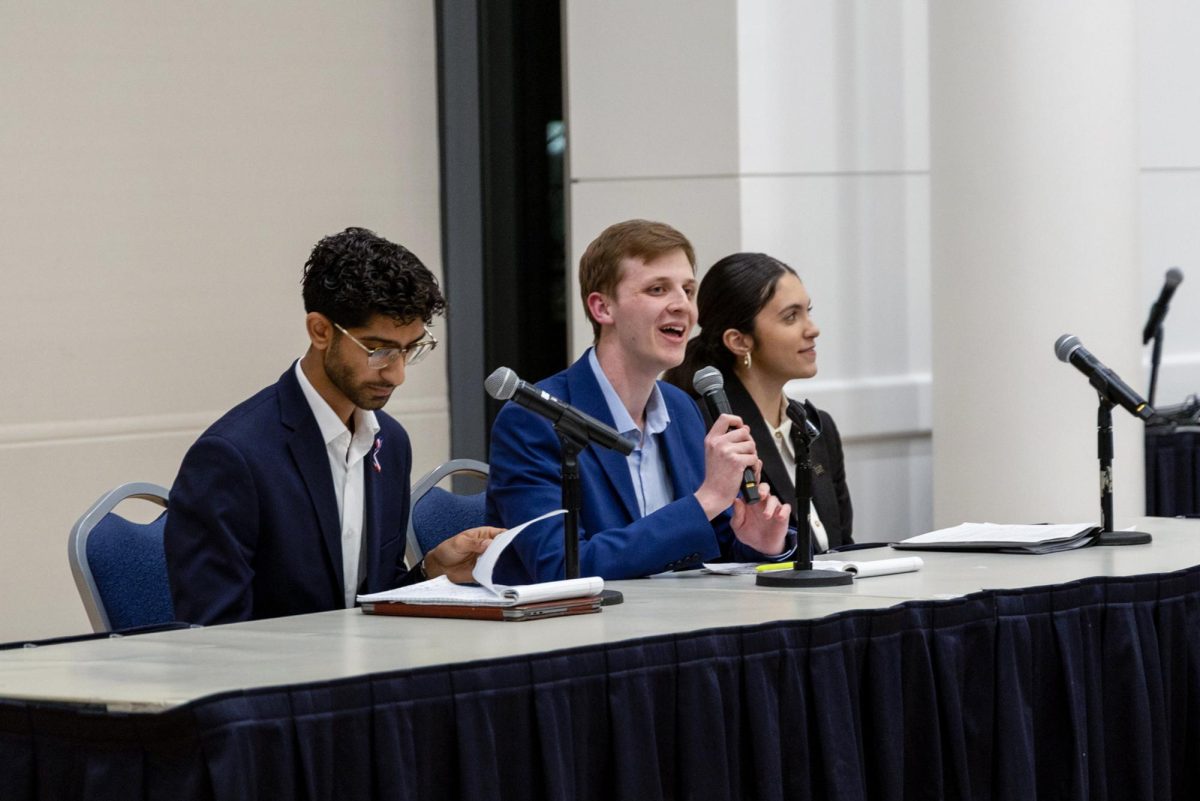As COVID-19 vaccinations increase across the District, students are confronting a new pandemic-era challenge: readjusting to looser distancing guidelines one year into the pandemic.
In interviews, half a dozen vaccinated students said despite the “peace of mind” they’ve felt since receiving their vaccine, they’ve struggled to get comfortable expanding their social circles after a year of following strict distancing guidelines. Experts in infectious diseases said vaccinated people are generally safe from contracting the virus and can socialize indoors with friends, but they should still practice social distancing guidelines outdoors to encourage others who aren’t vaccinated to do the same.
“I still follow [Centers for Disease Control and Prevention] guidelines, and I don’t think a vaccine is permission to go out and do whatever you want necessarily,” sophomore Caroline Jeffrey said. “It’s definitely been comforting though to know I can go out to eat and go do more outdoor activities with little worry.”
Jeffrey, a waitress at Homeslyce living in an off-campus apartment, said she feels more at ease visiting with friends in person because she received the Pfizer vaccine in March as an essential worker. She said her life in D.C. is “isolating” as an online student, but the fear of spreading the virus at her job kept her from expanding her bubble beyond her apartment.
Jeffrey said while she still only sees the same people from her social pod, engaging in more public activity, like studying in a cafe, is “super weird.” She said being vaccinated quells her anxieties when she is doing activities in crowded public spaces like running on the National Mall, but she still continues to practice CDC guidelines.
“My biggest worry was that I was the one putting people at risk because of my job,” Jeffrey said. “I have felt more comfortable going out to restaurants with friends and sitting outdoors, especially now because it’s nice out. I’m also really excited to be able to go home this summer and not worry I picked anything up during travel.”
Certain factors like gender, socioeconomic status, prevalence of COVID-19 cases in one’s home state and a higher perceived risk for infection were correlated with more social distancing observance, according to a November Understanding America study.
About 70 percent of the U.S. population will be vaccinated by the summer, the minimum threshold to achieve herd immunity, according to a report from The Atlantic. Earlier this month, students living in the District became eligible for the COVID-19 vaccine and can pre-register for an appointment through the District’s coronavirus website.
Freshman Nicholas Danilich said he received the Johnson & Johnson vaccine earlier this month with a group of his friends in D.C. He said he still feels hesitant doing activities in public out of routine after the past year of following distancing guidelines and worries a vaccinated student could still test positive for the virus.
But as he adjusts to the CDC’s new guidelines for vaccinated people, which permit indoor maskless gatherings with individuals who aren’t considered a severe risk, he is most looking forward to traveling with his friends over the summer, Danilich said.
“It’s kind of just nerves,” Danilich said. “Again, it’s always that thought in the back of your head, because we’ve been so conditioned the past year now.”
Junior Jack King, a student living in an off-campus apartment, said he posts daily updates of D.C. locations with available vaccine appointments on Twitter to encourage his peers to sign up and get vaccinated. King said he received both doses of the Pfizer vaccine last month after qualifying early as an essential worker.
He said keeping a very tight circle during the pandemic has been difficult because he was a “very social” person before beginning isolation last year. He said while he and his friends are still practicing distancing guidelines when they gather, he’s excited to see other friends who are fully vaccinated with less concern about contracting the coronavirus.
He added that the majority of his friends are now vaccinated, and the others are pre-registered for appointments. He said he is excited to participate in gatherings greater than 15 vaccinated people for a birthday celebration in July without “feeling guilty about it.”
“It’s a lot easier to see people with cases low and that sort of thing, but the vaccine to me really represents a lot of light at the end of the tunnel,” he said.
Experts in infectious diseases said students should still practice social distancing guidelines outdoors to be “conscious” of others who have not yet received the vaccine. But if a student’s entire friend group has been fully vaccinated, seeing them indoors and without face masks is safe, they said.
Paul Beninger, an associate professor of public health and community medicine at Tufts University, said students should check the CDC’s COVID-19 post-vaccination website once a week to guarantee they are up to date on the recent guidelines. He said students can gather indoors without masks with a low risk of contracting the virus, but they should still practice social distancing outdoors as more of the population awaits the vaccine.
“The people who are vaccinated are the ones who still need to be cautious, as much as anything to model behavior,” Beninger said. “Because people who aren’t vaccinated, they don’t know who’s vaccinated, who’s not vaccinated. They see people jumping around, acting crazy or doing all kinds of things. They don’t know if it’s because the vaccinated are there.”
Joshua LaBaer, a professor in personalized diagnostics and the director of the Biodesign Institute at Arizona State University, said the public is in an “in-between period,” which makes discerning the permitted activities for vaccinated students difficult. He said the United Kingdom’s coronavirus variant has been hospitalizing younger age groups more, so students should not be gathering in large groups maskless if they are not vaccinated.
He said he plans to host an end-of-semester pool party at his house with his entire ASU class without worry because everyone has been vaccinated.
“If you’ve been vaccinated, you need to look situation by situation,” LaBaer said. “If you’re going to an event or a party or something where everybody else is also vaccinated, then there are no issues.”








